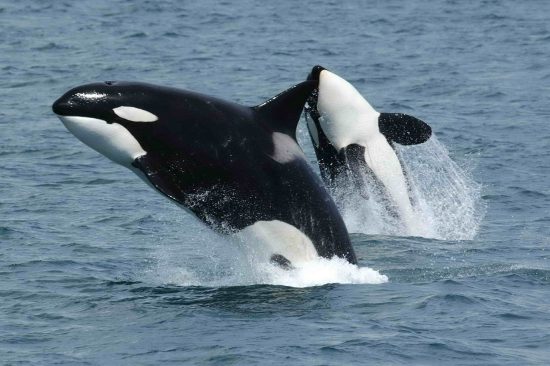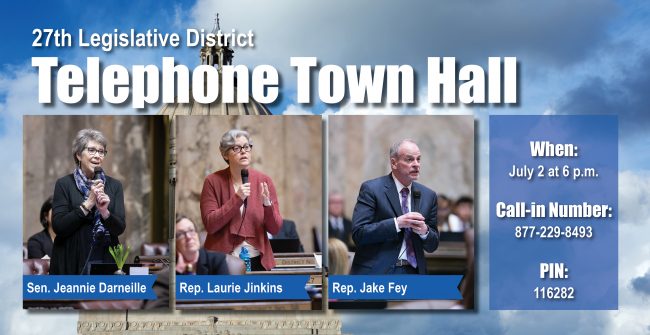Dear neighbors,
Those of us who care about protecting the environment have many reasons to be happy about the 2019 legislative session.
This was the most productive session in decades for clean energy, climate action, green transportation and charting a course to a cleaner future.
Climate action & clean energy
The science is clear: climate change poses significant risks to our economy, our health and our quality of life.
Advocates for clean air and champions of working people are joining forces, because we need clean air and good jobs.
100 percent clean electricity (HB 1211/SB 5116) — We’re transitioning to a clean energy future by requiring utilities to transition away from fossil fuel-generated electricity. With a preliminary “coal elimination” deadline of 2025, and a final “clean grid” deadline of 2045, Washington is firmly on a path to 100-percent clean energy from renewable and zero-emission sources like wind, solar and hydropower.
Switching to clean power works hand-in-hand with the reforms we passed in the Transportation Committee and other committees, including:
Green transportation (House Bill 2042) — I wrote this legislation to help Washington state transition to a zero-emissions transportation sector, with incentives to make electric vehicles more accessible to consumers. This new law also helps utilities invest in vehicle charging stations and creates a grant program that will help transit agencies electrify their fleets.
Transportation electrification (House Bill 1512) — I introduced this legislation to allow utilities in Washington state make needed investments in electric vehicle charging stations along with programs to assist customers switching from gas and oil to electric.
Green buildings (House Bill 1257) — It might surprise you to learn that buildings are the fastest-growing source of emissions in Washington state. Buildings are also the cheapest sector when it comes to reducing emissions. With this first-in-the-nation energy efficiency standard for large commercial buildings, we’ll retrofit older buildings and build even more efficient new ones, cutting carbon emissions quickly and economically while creating good-paying jobs.
Appliance efficiency (House Bill 1444) — New efficiency standards for certain appliances and design requirements for electric water heaters will reduce electricity and water use while also reducing greenhouse gas emissions.
Phasing out super pollutants (House Bill 1112) — Hydrofluorocarbons, or HFCs, are used as commercial and industrial refrigerants and foam-blowing agents. They are also super-polluting greenhouse gases that are thousands of times more damaging to the climate than carbon dioxide. We’re phasing out HFCs in our state thanks to this bill, transitioning to safe and cost-effective alternatives that already exist.
Protecting orcas, salmon and clean water

You may have seen the stories in the newspaper and television about our local orca’s being in trouble and their main food source, salmon, being in decline.
This session, we passed major legislation to protect salmon, orcas and the quality of our waterways.
Safeguarding our waters from oil spills (House Bill 1578) — There are only 75 Southern Resident orcas left; if we don’t act to protect them now, this iconic species will not survive. We’re reducing threats to orcas and marine life by reinforcing Washington state’s Oil Spill Prevention Act and the Strengthening Oil Transportation Act, requiring tug escorts for small oil tankers and barges traveling across narrow straights within the San Juan Islands.
Increasing Chinook abundance (House Bill 1579) — One of the biggest threats to continued survival of the Southern Resident orcas is the ability to find enough food to survive and reproduce. We’re helping them by updating our state’s oldest environmental law – the hydraulic code – and giving it more teeth. This will help protect the critical habitat that orcas, and the Chinook salmon they feed on, need to survive.
Protecting orcas from marine vessels (House Bill 1580 / Senate Bill 5577 — Reducing noise and disturbance from vessels will give orcas the space and quiet they need to find food and survive. We’re increasing the distance boats must stay from Southern Resident orcas and adding a go-slow zone for boats viewing them.
Cleaning up pollution, plastic waste and toxics
Preventing toxic pollution (House Bill 1194 / Senate Bill 5135) — Reducing exposure to toxic pollutants will help our critically endangered orca population and their prey, but it also helps all of us – particularly children and pregnant women. The state will help identify and remove pollution at its source before it enters our water supplies, food, homes and marine waters.
Reducing plastic packaging (House Bill 1204/Senate Bill 5397) — Plastic is filling our landfills – and oceans. Single-use and disposable plastics are cheap and convenient, but plastic pollution is a growing problem here and across the globe. We’re directing the state to study the management and disposal of plastic packaging and identify alternatives to achieve the goal of 100 percent recyclable, reusable or compostable packaging and 20% recycled content in all plastic packaging sold in Washington by 2025.
Paint stewardship (House Bill 1652) — Most paint can be recycled, keeping it out of our landfills, soil, and water. This requires producers of architectural paint to participate in an approved stewardship program that recycles or otherwise safely disposes of paint.
Toxic cleanup and reducing stormwater pollution (Senate Bill 5993) — We increased and reformed the hazardous substances tax levied on petroleum products, generating hundreds of millions of dollars to clean up contaminated sites, prevent future pollution, and improve how we manage storm ater runoff that harms the health of Puget Sound.
Your voice matters – 27th District telephone town hall meeting!
I hope you can join me for our telephone town hall meeting on July 2.
You should receive a phone call at 6 p.m. when the town hall begins. If you don’t get that call, please dial 877-229-8493 and use the pin 116282 to join the town hall, which is scheduled to last until about 7 p.m.
Anytime during the call, press *3 on your phone to get connected with a volunteer who’ll take down the basic details of your question. We try to get to ask many live questions as possible in an hour.
If we don’t get to your question, stay on the line at the end to leave us a voice mail with your question and we’ll get back to you with the answers.
I hope you can take part, and I look forward to your comments and questions!


